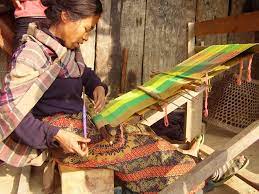

Call it a pilot project. Its aim is to up-skill the local weavers and artisans to enhance their productivity through RPL assessment and certification in traditional handicrafts.
This project was launched by Shri Rajeev Chandrasekhar, Minister of State, Ministry of Skill Development and Entrepreneurship; and Ministry of Electronics and IT, digitally on Wednesday. The project targets to upskill over 4,000 craftsmen and artisans.
The upskilling project under RPL is expected to improve the competencies of the unorganized workforce existing in geography. The artisans and weavers will be aligned with the standardized National Skills Qualifications Framework (NSQF).
It can provide access to existing artisans and weavers to sustain their livelihoods and enhance their skills, and technical knowledge. Additionally, the pilot project will augment the marketing skills and techniques, promoting traditional and local crafts of cane and bamboo artisans.
If it is implemented properly by the agencies involved, the initiative can add value to the traditional handicrafts through Upskilling Bridge Module through Government of India certification.
In any case, under the initiative, each batch shall run for 12 days with 12 hours orientation and 60 hours Bridge Module. Further, after the orientation programme along with the Bridge Module, the artisans and weavers shall be certified with the Recognition of Prior Learning (RPL) Type-1. The training delivery partners for the upskilling initiative are Cane Concept and Handloom Naga.
While launching it, Shri Chandrasekhar stated that skilling the youth is an important mission for the government and that is why he had gathered there to launch this event that trains and motivates artisans.
The project will be implemented in different phases including the selection of artisans and weavers, Training of Trainers (ToT), and upskilling of artisans and weavers through RPL with Bridge Module.
The artisans and weavers will be selected from the traditional crafts clusters of Nagaland. The selection will be made basis the existing experience of these candidates. The trainers will be selected either from the existing database or a Training of Trainer (ToT) programme will be conducted for the existing artisans and weavers from the proposed clusters.
The artisans and weavers will be trained in innovative and upgraded techniques of making handmade products. Post-training all the artisans and weavers will work in micro-units that are set up in their respective clusters. During this time the beneficiaries will be encouraged to participate actively in external deliberation so that at the final stage, they are able to manage market linkages on their own.
National Skill Development Corporation, the nodal implementation agency for the Ministry of Skill Development & Entrepreneurship, supported by Handicrafts and Carpet Sector Skill Council (HCSSC) will monitor the day-to-day progress of the project. The project aims at achieving learning outcomes including entrepreneurship development, digital literacy, communication skills at the workplace and development of sales, and marketing skills.
The project will also be backed by industry participation which is vital for the successful implementation of this project and the ongoing support. The industry will be supporting in areas like training of 150 trainers, infrastructure, providing raw material and promotion of crafts in domestic and international markets.